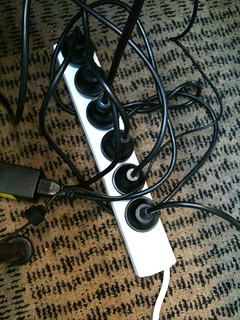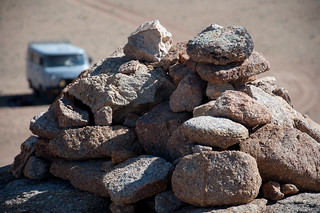| "The man with the burden", illustration from John Bunyan's dream story (based on Bunyan's Pilgrim's Progress) (p. 18) abridged by James Baldwin (1841-1925) (Photo credit: Wikipedia) |
Well, to be perfectly honest, I don't want to do chronic pain at all. But since it looks like that's God's will for my life at this time, I don't want to mess it up. I don't want to miss the blessing God has in mind for me in it.
I've failed to seek His best in my pain plenty of times. My first battle with chronic pain began when I was eight years old , when spinal deformity began grinding my vertebrae down into the wedge shapes that would result eventually in permanent kyphosis. You can read more about the story here if you like.
Pain has been a pretty constant companion ever since then, some times worse than others. And so I learned to study, knit, crochet, and write to my heart's content...sedentary activities which I thoroughly loved and which became my focus.
Activities that caused more pain...or that I feared might cause more pain, became anathema.
In the past several years, thanks to medical interventions of various types for various problems, the pain had become a lot less … until peripheral neuropathy entered the scene. My search for the right medicine continues, as the pain invades more and more of my life.
But I don't want this to be a depressing article, nor should it be. You see, I've been reading Jerry Sittser's helpful book, "When God Doesn't Answer Your Prayers." In it I found this mind-blowing, paradigm-shifting quote:
"If we pray for healing, it will be to render better service to God. But if we continue to be sick, we will strive to honor God all the same, 'whether we live or die,' as the apostle Paul put it. If we pray for a job, it will be to use our position and resources to build his kingdom and not our own. If we can’t find a job, we will use our time and struggles to glorify God. We will put God first in everything."
That quote stopped me in my tracks. When I pray for healing, is it so that I can render better service to God? I have to admit, it's not. I pray for healing so that I can be free from pain, for no other reason than that I don't like pain. And to be honest, when I imagine my desired pain-free life, it looks like a whole lot more self-indulgence.
After all, that's what my life tends to look like anyway. I have the luxury of being allowed to indulge my appetite for study and for craft work, at the expense of (at the very least) my homemaking. And I'd like to continue to focus on those things without pain, thank you Lord.
But... "If we pray for healing, it will be to render better service to God."
Last night I bowed out of doing AWANA because my feet and legs hurt so badly. But I couldn't help wondering, shouldn't I have tried? What if I had gone and served, despite my pain? I can think of a limited number of possible outcomes:
- The pain might have increased until it was unbearable, and I might have had to give up and go home. But I would have known that I had done my best. And, at least for a time, God and others would have been lovingly served.
- The pain might have been lessened or even removed by an act of God's grace, and I would have had a wonderful testimony of His mercy. And both God and others would have been lovingly served.
- The pain might have stayed the same, or even gotten worse, but I might have felt God strengthening me to endure it, and I would have had joy in that gift of grace. And yes, God and others would have been lovingly served.
Now don't worry...it's not my intent to say that no one should ever bow out of things because of pain. Sometimes there's really no choice. Nor do I mean to imply that God is calloused to our pain, and frowningly expects us to "buck up." Of course our tender, loving Father cares!
But what if, in His great mercy and wisdom, He has decreed our "thorn in the flesh" to keep us humbly dependent on Him while we, by His grace, pursue Kingdom goals? What if the "Good works which God prepared in advance for us to do" (Eph 2:10) include works done in pain?
What if God sees that the rewards, joys, and glories that await us in heaven are far more worthy of our pursuit than anything we try to acquire for our own fading, earthly kingdoms?
What if God sees that the rewards, joys, and glories that await us in heaven are far more worthy of our pursuit than anything we try to acquire for our own fading, earthly kingdoms?
The Apostle Paul certainly believed that!
I consider that the sufferings of this present time are not worth comparing with the glory that is to be revealed to us. (Romans 8:18)
I know myself, and how I default to comfort, to ease, to pursuing my own interests in my own tiny, self-indulgent world. Frankly, if I'm not careful, I can easily turn even "serving others" into a self-indulgent pursuit of pharisaical notches in my spiritual belt, rather than as the joyful privilege it truly is. And as soon as serving becomes inconvenient or painful, comfort takes precedence with me, almost every time .
As a point of doctrine, I believe that the rewards of heaven are infinitely worth whatever we suffer on this earth. But when I take a painfully honest look at how I live, I am forced to conclude that that belief hasn't infiltrated my life.
Can you relate? God help us!
The only way out is to be changed by the Spirit of God into people who truly seek first the Kingdom of God and His righteousness...and to do that for His sake, not for our own religious pride. When His Kingdom and righteousness are our true goal and focus, we can honestly pray for healing in order to render better service to God and others … and we can more often find the strength to serve even when the pain persists.
If you're in the same boat with me, please join me in prayer. (And yes, this prayer DOES scare me to death...)
Father, I repent of holding my own comfort up as the ultimate good in my life. Help me to believe all the way to my fingertips, and to the ends of my burning toes, that serving You and others in love is a far greater joy and privilege than the comforts I so doggedly seek. Help me to have the courage to step out in faith and do as much as You enable me to do; by Your grace rather than by my grit, with joy rather than complaint, and with love rather than a martyr complex. Make me more like Jesus! In Jesus name, amen.
P.S. Another excellent book that I can't recommend highly enough is Joni Eareckson Tada's "A Place of Healing." Get it and soak in it if you can!
P.S. Another excellent book that I can't recommend highly enough is Joni Eareckson Tada's "A Place of Healing." Get it and soak in it if you can!


























